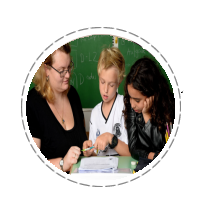5 Reasons why KOMPASS Education is the most child friendly school in Egypt.
 5 Reasons why KOMPASS Education is the most child friendly school in Egypt
5 Reasons why KOMPASS Education is the most child friendly school in Egypt
For 15 years KOMPASS Education Maadi has been steadily and sustainably maintaining its educational approach, with more and more confident teenagers graduating and transitioning to international schools in Egypt and abroad.
SO WHAT IS KOMPASS? AND WHAT IS SO DIFFERENT ABOUT THE KOMPASS APPROACH?
1. KOMPASS GREW WITH ITS CHILDREN.
It all started in 2008, when a group of passionate educators had a dream, and that dream was to bring truly progressive early childhood education to Egypt. For expatriate families to be able to find what they seek for their children, and for like-minded Egyptian families to enjoy what was never available in the country.
As KOMPASS children grew, KOMPASS grew with them. Accordingly, KOMPASS evolved from a kindergarten, to a nursery in 2009, opened a primary school in 2012, and expanded into a middle school in 2018. The sole purpose that drove KOMPASS to expand every single time was that children and parents did not want to leave. The KOMPASS team did not want them to leave either. And this is how KOMPASS evolved over the years, hosting today children as young as 1 up to adolescents at the age of 14.
2. TEACHER TO CHILD RATIO.
As KOMPASS Nursery and Kindergarten evolved to a school, the unique child-o-teacher ratio remained as important as it has always been. And with its organic expansion, the KOMPASS team has always been and still is committed to their quality objective which is to offer individualized education to guide each child to become the best version of themselves.
KOMPASS adhered to the provision that sets them apart:. 1 teacher for every 3 nursery children, 1 teacher for every 5 children in the kindergarten aged 3 to 5, and 1 teacher per every 10 learners at the school.
It is this particular setup that allows the KOMPASS team to see the individual child, and to observe and document as a necessity for customized learning. At KOMPASS, every single child is seen as an individual. No child is another number. Teachers know what each child likes and dislikes, food they adore and food they average, their family members by names, and every detail that makes an individual unique themselves. The KOMPASS philosophy acknowledges that traditional education where all children of the same age should achieve the same goal at the same time, with the same teacher, using the same materials, at the same pace, equally well, will not sufficiently prepare for the challenges of the 21st century. The learning environment and the teacher provision at KOMPASS reflect that.
3. WEEKLY COACHING TALKS.
KOMPASS children know from an early age that they have a voice, and this voice is always heard. Starting at the age of 5, children at the primary school have a personal weekly coaching talk with their coaching teacher. The child gets to express their feelings, and tell their stories. The teacher listens, offers feedback and advice, and they agree on how best to move ahead. This is an effective way for teachers to learn about their students. For young learners, coaching conversations are shared with the parents. And this is one of many aspects that make KOMPASS a teacher-parent collaborative environment.
4.SMOOTH TRANSITIONS.
As children progress on their learning journey through KOMPASS, transitions had to be defined.. Transitions within KOMPASS are targeted to ensure a smooth move from one section to the next, taking into consideration the child’s individual readiness and needs. Especially younger children spend some time between both sections, until the child is completely ready to transition happily.
5. FOOD IS AN ESSENTIAL FACTOR FOR BRAIN DEVELOPMENT.
Enjoying healthy meals together is part of the educational concept. Three nutritious meals are offered each day children and teachers enjoy the diverse, homemade KOMPASS cuisine for breakfast, lunch and the afternoon snack. Alterations are only made for children who have allergies or intolerances. Teachers role-model and practice table manners, address healthy nutrition and encourage children to try all kinds of food. Early independence is an educational goal, particularly for the youngest KOMPASS children; they learn how to serve themselves, clean after their mealtime, and of course help teachers and kitchen staff prepare whatever is necessary before the mealtime begins.
Primary and Middleschool learners participate in menu composition. They share their feedback and discuss what they would love to eat during their weekly children’s conferences. Changes are made according to their choices and collaborative efforts of setting the menu with their teachers.
Stay tuned for the next KOMPASS Story, 5 Facts you Didn’t Know About KOMPASS
